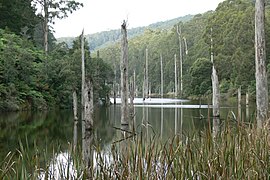Otway National Park
|
Great Otway National Park Victoria |
|
|---|---|
|
IUCN category II (national park)
|
|

Lake Elizabeth, formed from a landslide in August 1953, it broke its banks allowing the West Barwon River to flow.
|
|
| Nearest town or city | Apollo Bay |
| Coordinates | 38°46′24″S 143°33′27″E / 38.77333°S 143.55750°ECoordinates: 38°46′24″S 143°33′27″E / 38.77333°S 143.55750°E |
| Established | 11 December 2005 |
| Area | 103 km2 (39.8 sq mi) |
| Managing authorities | Parks Victoria |
| Website | Great Otway National Park |
| See also | Protected areas of Victoria |
The Great Otway National Park, located in the Barwon South West region of Victoria, Australia. The 103,185-hectare (254,980-acre) national park is situated approximately 162 kilometres (101 mi) southwest of Melbourne. It contains a diverse range of landscapes and vegetation types and is situated within the Otway Ranges.
The park was declared in 2004 when Otway National Park, Angahook-Lorne State Park, Carlisle State Park, Melba Gully State Park, areas of the Otway State Forest and a number of Crown Land reserves were combined into one park. The parks were combined after a campaign by the local community and the Otway Ranges Environment Network and were officially gazetted on 11 December 2005.
The park is a popular area for interstate and international tourists, with companies operating tours in the region. It contains three camping areas at Johanna, Aire River and Blanket Bay. The park is accessed from the east via Apollo Bay, from the north via Forrest or Beech Forest, or from the west via Princetown. The park covers both coastline and hinterland in the Otway Ranges and so includes both beaches and forest, accessible via walking trails. The park and the Aire River campground are home to a significant koala population. The Cape Otway Lighthouse is adjacent to the park and is open to tourists throughout the week. Migrating whales and dolphins such as southern right and southern humpback, and bottlenose dolphins can be observed from the coasts.
...
Wikipedia

